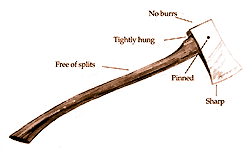By E. Brown
One of the buzz-words of the 90’s was knowledge management or KM. In this age of what Peter Drucker called the Knowledge Worker, has the practice of KM taken a backseat? Are we all too busy to worry about it?
In their book, If Only We Knew What We Know, O’Dell and Grayson say, a few organizations are learning to mine knowledge…
…They are tapping into this hidden asset, capturing it, organizing it, transferring it, and using it to create customer value, operational excellence, and product innovation–all the while increasing profits and effectiveness.
Yet,
…Some of the most intellectually curious, performance-oriented organizations in the world…[do] not even know about [best] practices hidden, untouched and undocumented, inside the walls of their own organizations.
Why is this?
 Sharpening The Axe
Sharpening The Axe
Stephen Covey talks about the principle of Sharpening The Axe — sharpening your knowledge, skills, and expertise.
Read this brief parable, from the Story Bin, and see if you can relate:
A young man approached the foreman of a logging crew and asked for a job.
“That depends,” replied the foreman. “Let’s see you fell this tree.”
The young man stepped forward, and skillfully felled a great tree.
Impressed, the foreman exclaimed, “You can start Monday.”
Monday, Tuesday, Wednesday, Thursday rolled by — and Thursday afternoon the foreman approached the young man and said, “You can pick up your paycheck on the way out today.”
Startled, the young man replied, “I thought you paid on Friday.”
“Normally we do,” said the foreman. “But we’re letting you go today because you’ve fallen behind. Our daily felling charts show that you’ve dropped from first place on Monday to last place today.”
“But I’m a hard worker,” the young man objected. “I arrive first, leave last, and even have worked through my coffee breaks!”
The foreman, sensing the young man’s integrity, thought for a minute and then asked, “Have you been sharpening your axe?”
The young man replied, “No sir, I’ve been working too hard to take time for that!”
No Time
I had lunch with a friend yesterday. He is in training and was telling me about a series of software classes he teaches. The days are long and the information covered is enormous.
“Why do you try to cover so much in such a short period of time?” I asked.
“Because, companies do not want to let their people go for more than a couple days. They feel it loses productivity.”
Now, in light of the story above, how much sense does that make?
Productivity
I remember the mantra of early computing: We’ll be able to get more done in less time and have more recreational opportunities. To which Dr. Phil McGraw would say, “How’s that working for you?”
Because of the increase in information and knowledge to share, personal productivity gurus like David Allen have become very popular. We have increased the rate of information transfer yet we do not know how to process all the information. We either end up getting bogged down or we only use a fraction of our potential.
So, is KM dead? I do not think so.
Many organizations are using their intellectual capital to make a difference. The new buzz-words are things like, Business Intelligence (BI), Collaborative Networks, and Collective Intelligence. Still, it is all the same. We are capturing, managing, and transferring knowledge. Those organizations that make a commitment to practice training, equipping, and sharing will survive and thrive, those that neglect this practice do so at their own risk.













Great post, Eric. Good read. It’s amazing how much more productive we as employees would be if our employers took some time to train us in new areas, send us to seminars, conferences, etc. We waste much more time when we have to learn things “on the fly” rather than getting the proper training beforehand.
If “sharpening your axe” was all that is needed…whatever happened to play hardball with soft skills?
“They feel it looses productivity.”
“LOSE”, losing something is different to loosening it….that pisses me off.
In most companies, mine included, there is little formal training, even less accountability, and not much in the way of consequences for screwing something up, or not knowing how to do something.
I spend most days apologizing for errors made by someone eles, and getting yelled at when I can’t get them fixed fast enough.
I have some knowledge that can be managed, it’s that MANAGEMENT ARE A BUNCH OF CHIMPS.
madriduno, thanks for catching the typo — ease off on the coffee, OK? -eb
Pretty nice article, genuinely beneficial information. Never ever thought I’d discover the information I need in this article. I’ve been scouring throughout the net for a while now and was starting to get disappointed. Thankfully, I stumbled across your blog and got precisely what I had been hunting for.